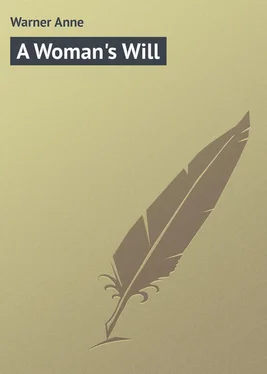Anne Warner - A Woman's Will
Здесь есть возможность читать онлайн «Anne Warner - A Woman's Will» — ознакомительный отрывок электронной книги совершенно бесплатно, а после прочтения отрывка купить полную версию. В некоторых случаях можно слушать аудио, скачать через торрент в формате fb2 и присутствует краткое содержание. Издательство: Иностранный паблик, Жанр: Путешествия и география, literature_19, foreign_prose, foreign_language, на английском языке. Описание произведения, (предисловие) а так же отзывы посетителей доступны на портале библиотеки ЛибКат.
- Название:A Woman's Will
- Автор:
- Издательство:Иностранный паблик
- Жанр:
- Год:неизвестен
- ISBN:нет данных
- Рейтинг книги:5 / 5. Голосов: 1
-
Избранное:Добавить в избранное
- Отзывы:
-
Ваша оценка:
- 100
- 1
- 2
- 3
- 4
- 5
A Woman's Will: краткое содержание, описание и аннотация
Предлагаем к чтению аннотацию, описание, краткое содержание или предисловие (зависит от того, что написал сам автор книги «A Woman's Will»). Если вы не нашли необходимую информацию о книге — напишите в комментариях, мы постараемся отыскать её.
A Woman's Will — читать онлайн ознакомительный отрывок
Ниже представлен текст книги, разбитый по страницам. Система сохранения места последней прочитанной страницы, позволяет с удобством читать онлайн бесплатно книгу «A Woman's Will», без необходимости каждый раз заново искать на чём Вы остановились. Поставьте закладку, и сможете в любой момент перейти на страницу, на которой закончили чтение.
Интервал:
Закладка:
“It is fortunate,” she agreed.
“Yes,” he answered, “for me it was very good.”
They had come to the crossing of the great square, and the sunlight was dazzling and dancing upon the white stones of the bridge and the molten gold of the Vierwaldstattersee. The Promenade was deserted and even its shade was unpleasantly warm.
“Shall I see you this afternoon?” Von Ibn asked as they went leisurely through the heat.
“Perhaps.”
“I wish it was after the déjeuner ,” he said, looking out upon the lake and the crest of the mountain beyond.
She wondered if she had better say “Why,” or not, and finally decided to say it. He brought his eyes back from the Rigi and looked at her.
“Because I have the habit of always sleeping after déjeuner ,” he explained.
They crossed to the hotel. It was late, and more people were coming down in the lifts than going up.
“Are you tired?” he asked.
“Yes, I think that I am – a little.”
“I advise you to sleep too,” he said gravely.
“I always do.”
“So,” he cried triumphantly, “you see I say the truth when I say that we are very sympathique !”
Rosina looked up at him and her eyes danced; he returned the look with a responsive glow in his own big pupils.
“I am so glad we meet,” he exclaimed impulsively.
She stepped out of the lift and turned to dismiss him.
“And you?” he asked, bowing above her hand.
“I’m glad too,” she said, and her tone was most sincere.
Chapter Three
LATE in the afternoon of the same day Ottillie, coming in to wake her mistress from a nap which the morning’s long walk had resulted in stretching to a most unusual duration, brought with her a great bunch of those luxuriantly double violets which brim over with perfume and beauty. There was also a note, very short, and couched in a flawless French.
If one must be roused out of a delicious sleep on a warm June day, surely violets, and such a note as accompanied these particular violets, were the least disagreeable means ever invented for accomplishing that end. Rosina’s frown for Ottillie changed into a smile for some one else, and she rose from among her pillows and submitted to her toilet with a good grace. Ottillie, who was French enough and experienced enough never to need to be told things, divined what the note must have contained the second time that she saw her mistress glance at the clock, and so accelerated her ordinary rate of movement that even the gown of lace which appeared to fasten nowhere, was fastened everywhere ere the town bells rang five.
A few minutes after, a garçon in the hotel livery brought up a card, and, Continental etiquette made it quite en règle for Monsieur von Ibn to be ushered into the dainty little salon which the Schweizerhof permitted Rosina to enjoy (for a consideration), and there muse in company with his own violets, while he waited and turned his cane over and over in his gloved hands.
Then Ottillie opened the portières beyond, and Rosina appeared between them, delightfully cool and fresh-looking, and flatteringly glad to see him.
“We seem like quite long friends, do we not?” he said, as he bent above her hand and kissed it lightly.
“Yes, certainly, I feel that I have the sensation of at any rate three weeks,” she answered; and then she sank luxuriously down in a great fauteuil , and was conscious of an all-pervading well-content that it should be too warm to go out, and that he should be there opposite her while she must remain within. She was curious about this man who was so out of the ordinary, and the path along which her curiosity led her seemed a most attractive one.
“Why do you say three weeks,” he asked; “why not three months or three years?”
“But in three years one learns to know another so well, and I do not feel – ”
“Oh,” he interrupted, “it is better as it is; perhaps you may be like I am, and get weary always soon, and then have no longer any wish to see me.”
“Do you get tired of every one?”
He passed his hand across his eyes and sighed and smiled together.
“Yes, madame,” he said, and there was a sad note in his voice, “I get often tired. And it is bad, because I must depend so deeply on who I speak with for my mind to be able to work after. Comprenez-vous? ”
She made a movement of assent that he seemed to have paused for, and he continued.
“When I meet a stranger I must always wonder how soon I shall be finished with him. It comes very soon with nearly all.”
“And are you sure that you are always the weary one?”
He looked blank for a moment, then,
“I have already bore you; yes?”
“Not at all, but I was warned this morning that you might possibly commit such a crime.”
“And have I?”
She looked on his earnestness and smiled.
“Have I?” he reiterated; “yes?”
Then she spoke suddenly.
“Why do foreigners always say ‘yes’ at the end of every question that they ask in English? I get so tired of it, it’s so superfluous. Why do they do it?”
He reflected.
“It is polite,” he said, after a moment. “I ask you, ‘Do I bore you?’ and then I ask you, ‘Do I?’”
“But why do you think that it is polite to ask me twice?”
He reflected again, and then replied:
“You are equally droll in English; you are even more droll in English, I think. You say, ‘You will go to walk, will you not?’ and the ’not’ makes no sense at all.”
It was her turn to reflect, and be forced to acquiesce.
“Yes, that is true.”
“And anyway,” he went on, “it is polite for me to ask you twice anything, because that shows that I am twice anxious to please you.”
“So!”
“Yes;” he took a violet from the bowl at his side and began to unclose its petals. “Why did he say that?” he asked, suddenly raising his eyes from the flower to her.
“He! who?”
“Our friend.”
“Why did he say what?”
“Why did he say that I was stupid? I have never been but nice to him.”
She looked startled.
“He never said that you were stupid.”
“You said that he told you that I was stupid.”
“No, I did not. I said that he warned me that – ”
“Oh, it matters not,” he broke in, shrugging his shoulders slightly, “ ça ne me fait rien . What he may think of me matters me not at all. Pauvre garçon , he is so most uninteresting himself that I cannot expect interest from him. Ecoutez-donc! for him nothing exists but golf; for him where golf is there is something, elsewhere there is nothing anywhere. What did he say to me of Paris? he said that for him Paris was nothing, because no one plays golf; he said he could throw a dog all over the grounds any morning. I did not ask him what dog, or why a dog, for I thought it was not truly a dog, but just his bad American argot ; and, if I must speak truth, pardon me that I find it very good that so stupid a fellow finds me dull. If he found me amusing, I should naturally know that I, too, must be a fool.”
He put the violet to his lips and smiled a little.
“He speaks but English,” he added; “he knows but golf, he has been around the world and has seen nothing. I am quite content to have such a man despise me.”
Then he was silent, biting the purple flower. Rosina rested her chin upon her hand.
“Please go on,” she said briefly, “I am listening.”
He looked at her and smiled.
“I do like Americans,” he went on, “and I see that all the women have small waists, and do not grow so large so soon, but I do not see why they do not learn many things and so become much more nice; why, for example, are they so ignorant of all the world and think their own country alone fine?”
Читать дальшеИнтервал:
Закладка:
Похожие книги на «A Woman's Will»
Представляем Вашему вниманию похожие книги на «A Woman's Will» списком для выбора. Мы отобрали схожую по названию и смыслу литературу в надежде предоставить читателям больше вариантов отыскать новые, интересные, ещё непрочитанные произведения.
Обсуждение, отзывы о книге «A Woman's Will» и просто собственные мнения читателей. Оставьте ваши комментарии, напишите, что Вы думаете о произведении, его смысле или главных героях. Укажите что конкретно понравилось, а что нет, и почему Вы так считаете.












